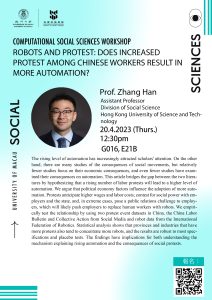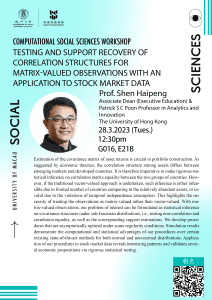Friendly Reminder: FSS Computational Social Sciences Workshop: “Robots and protest: does increased protest among Chinese workers result in more automation?” by Prof. Han ZHANG (20 April, 12:30, E21B-G016)
edithm2023-04-21T00:00:00+08:00The Faculty of Social Sciences (FSS) is holding a series of Computational Social Sciences Workshop. We have the pleasure to invite Prof. Han ZHANG to deliver the fifth seminar on “Robots and protest: does increased protest among Chinese workers result in more automation?”. Details of the Workshop are as follows:
Date: 20 April 2023 (Thursday)
Time: 12:30 – 14:00
Venue: E21B-G016
Language: English
Please register by 19/04/2023 (Wednesday) 1pm:
https://forms.gle/yHaC5rkVyLRwy8bL6

Speaker: Prof. ZHANG obtained his Ph.D. in Sociology at Princeton University in 2020, under the supervision of Matthew Salganik, and B.S. in Computer Science and B.A. in History, 2013, from Peking University. His research spans computational social science, social movements, social networks, and quantitative methods. Recent substantive projects include Protests and their causes and consequences; Global surveillance and its social impact. His recent methodological projects include Image as data, Robust use of machine learning algorithms in social science research, and Graph neural network and survey data.
Abstract: The rising level of automation has increasingly attracted scholars’ attention. On the other hand, there are many studies of the consequences of social movements, but relatively fewer studies focus on their economic consequences, and even fewer studies have examined their consequences on automation. This article bridges the gap between the two literatures by hypothesizing that a rising number of labor protests will lead to a higher level of automation. We argue that political economy factors influence the adoption of more automation. Protests anticipate higher wages and labor costs; contest for social power with employers and the state, and, in extreme cases, pose a public relations challenge to employers, which will likely push employers to replace human workers with robots. We empirically test the relationship by using two protest event datasets in China, the China Labor Bulletin and Collective Action from Social Media and robot data from the International Federation of Robotics. Statistical analysis shows that provinces and industries that have more protests also tend to concentrate more robots, and the results are robust to most specifications and placebo tests. The findings have implications for both understanding the mechanism explaining rising automation and the consequences of social protests.
